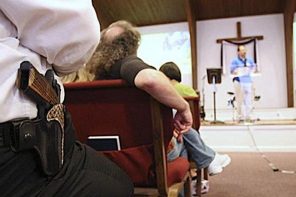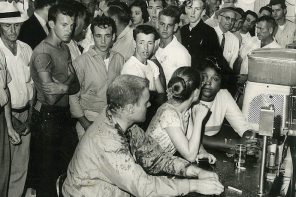Start with the idea of hope. S.M. Smith, summarizing the work of Jurgen Moltmann, writes:
The church is to be seen as the people of hope, experiencing hope in the God who is present in his promises. The coming kingdom gives the church a much broader vision of reality than a “merely” private vision of personal salvation. The church is to contest all the barriers that have been constructed by man for security; it challenges all structures that absolutize themselves, and all barriers erected between peoples in the name of the reality that is to come in Jesus Christ. The coming kingdom creates confronting and transforming vision for the mission of the people of God.
And Walter Brueggemann says,
Hope is the refusal to accept the reading of reality which is the majority opinion, and does that only at great political and existential risk.
Hope is subversive, and it is impatient with present realities. Keep all of this in mind as you read Cynthia Tucker talking to a psychology professor about the present political situation:
“When people are anxious and angry, they look to their leaders for a way to channel that anger that is productive. That is part of what leadership is. (But) this president and his leadership team believe that leadership is channeling hope, and even touching anybody’s anger and anxiety is off limits. It’s the politics of Dukakis,” Westen said.
This perhaps unintentionally gets at the nub of the issue. Not all Americans are members of a church. They’re certainly not The Church. But they are looking for something beyond personal salvation, in the economic as well as the soteriological sense. By large majorities, we want our leaders to contest the barriers that keep us from one another, all the absolutized structures that divide us into a nation of haves and have-nots.
We are, in brief, pissed off and looking for real answers.
Furthermore, we are looking for a sense of purpose as a nation. This is often overlooked in talk about the damage forty years of conservative ascendancy has done to the nation. From Richard Nixon to George W. Bush, we went from being a country with a collective (if contested) purpose to being one with no real reason to be other than getting some for ourselves. That obviously has hurt our sense of community, but it has also wounded our collective psyche. We are hungry for “action and change,” in James Cone’s words, and we don’t mean just frittering around the edges.
Why someone like Barack Obama, who ran on the themes of hope and change, would get down in the mud with someone like Rahm Emanuel, whose entire political career has been dedicated to stasis, I do not know.
I do know this: he’s got just about one chance left to convince the nation that his vision does include meaningful action and change. Otherwise, he will be rejected as a prophet of false hope, and the anger seething through the nation will be uncontainable.
We’ll know which path he’s chosen almost immediately. Brueggemann says that prophetic energizing depends on recalling – and mourning – the past, then articulating with amazement the new possibilities we are being led into.
If Obama starts off his message with a statement of optimism that a deal can be struck, we’re screwed.
But if he begins with a recitation of American history, laments the order that has passed away, and recognizes the anger and anxiety its demise has provoked, we have a shot. The last thing he will have to do is announce his willingness to confront the powers that are propping up the old order and his intent to transform the system so Americans can get back to their national mission. That and commit to a public option. Then – and only then – can we have some real hope.
(h/t to John Aravosis)



